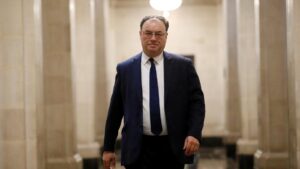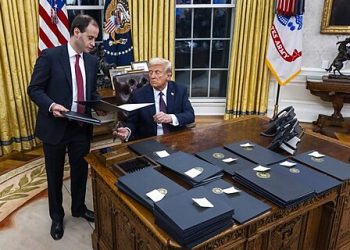The Bank of England has raised interest rates to pre-pandemic levels in an attempt to control inflation, which is at its highest in 30 years.
The central bank’s monetary policy committee voted 8-1 to raise rates by 0.25 points to reach 0.75 per cent in efforts to contain inflation, which is at 5.5 per cent and likely to continue rising because of spikes in global energy prices. One member of the committee opted for holding rates at 0.5 per cent.
The Bank now expects inflation to reach 8 per cent next month, up from its forecast of 7.25 per cent last month. Officials cautioned, however, that inflation could climb “several percentage points” higher than its February projections in October when households receive their gas bills, which are calculated based on energy prices in the first half of the year. The utility price cap, which is due to rise by 54 per cent in April, could again be “substantially higher” when it is reset in autumn, according to central bank officials.
The decision did not come as a shock to financial markets, which before the meeting had priced in a 100 per chance that interest rates would rise by 0.25 points. The FTSE 100, which was trading flat before the decision, rose 27 points, or 0.4 per cent, to 7,319 and the more UK-focused FTSE 250 dipped 2 points to 20,898.69.
More than a quarter of mortgage borrowers, around 2.2 million, are on home loans linked to the base rate and can expect to see their mortgage bills increase. Savers are expected to be disappointed. Rachel Springall, finance expert at Moneyfacts.co.uk, said: “Not one of the biggest high-street banks has passed on the last two base rate rises to savers who have an easy access account.”
The Bank played down the likelihood of future rate rises despite the onset of the war in Ukraine and escalation in global oil and gas prices since its last meeting at the beginning of February. Officials said that further “modest tightening” of monetary policy “may be appropriate” in the coming months. They had previously cautioned that rate rises would be likely.
Raising interest rates increases the cost of borrowing and offers a higher return on savings. It is intended to encourage people to save rather than spend, reducing demand and, in theory, prices. The Bank’s target rate of inflation is 2 per cent.
Officials said that if shocks to the economy from the war in Ukraine persist, higher global energy prices will drag down income and spending in the UK as it is a net importer of these goods. “This is something monetary policy is unable to prevent,” they said in the meeting minutes.
The war is likely to worsen global supply chain disruptions and increase uncertainty over the outlook for the economy, they said, adding: “Global inflationary pressures will strengthen considerably further over coming months, while growth in economies that are net energy importers including the United Kingdom, is likely to slow.”
Price rises are not solely caused by energy prices, however. The rise in the consumer prices index from 5.4 per cent in December to 5.5 per cent in January was driven by rises in the price of clothing and footwear, increasing concerns among economists that inflation was becoming embedded in the economy rather than simply caused by external factors. Figures for February are expected next week.
Unemployment fell to a near record low of 3.9 per cent in the three months to January and vacancies continued to rise, reaching a record high of 1.3 million in February.
The Bank of England expects that economic growth at the beginning of the year was stronger than previously expected, but it is expected to slow later in the year by more than previously expected.
Jon Cunliffe, an internal member of the committee who voted to raise rates at the last three meetings, opted to hold rates at 0.5 per cent to give more time to make a fuller assessment given the current volatility in the price of commodities.
The hit to take-home pay is likely to be “materially larger” than the 2 per cent decline predicted in the February report, the committee said. Officials warned last month that real income, which is the value of earnings after they are adjusted for the impact of inflation, will fall by five times the amount they had in the aftermath of the 2008 financial crisis.
Rishi Sunak, the chancellor, is under pressure to introduce tax breaks and spending plans in his spring statement on Wednesday next week. The statement, which was not originally intended to be a “mini-Budget,” is expected to introduce new policies to help households and businesses to tackle the rising cost of living.
















